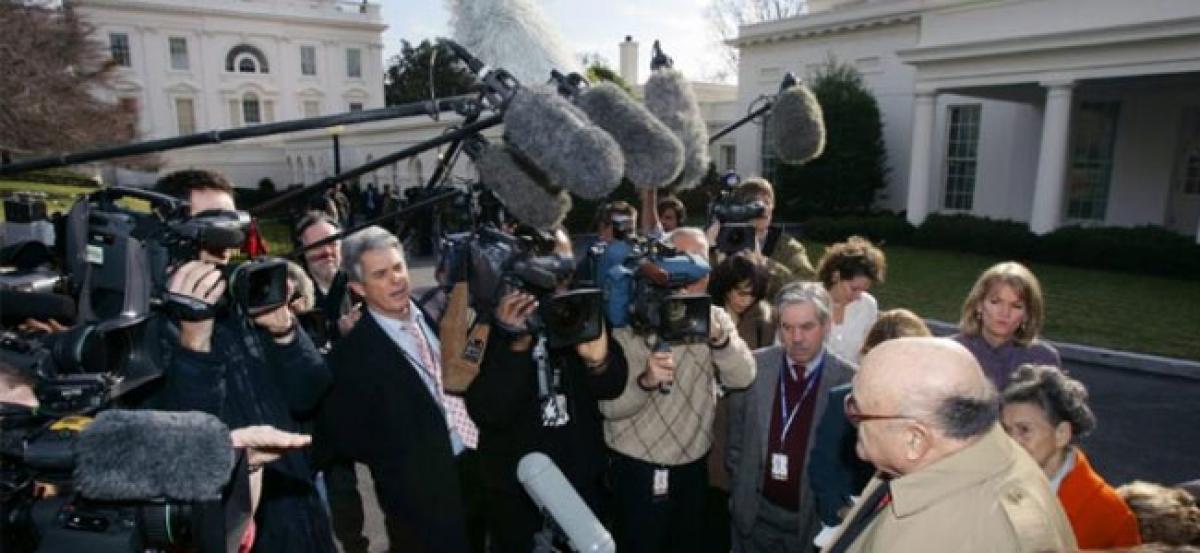Live
- GMR Airports Unveils AI-Powered Digital Twin Platform to Transform Airport Operations
- India poised to become leading maritime player: PM Modi
- Top Causes of Kidney Stones and How to Recognize Silent Symptoms
- India’s renewable energy capacity logs 14.2 pc growth at 213.7 GW
- Winter Session of Odisha Assembly adjourned sine die
- Biden calls Trump's tariff approach 'major mistake'
- After Drama Over Eknath Shinde’s Chief Minister Race, Maharashtra Cabinet Formation Faces New Tensions
- Egyptian FM, Blinken discuss recent developments in Syria
- Iran's supreme leader says Syria's developments result of US-Israeli 'plot'
- Elon Musk to Purchase $100 Million Luxury Mansion Next to Donald Trump's Mar-a-Lago, Report Reveals
Just In

Melvin Laird, who as defense secretary under President Richard Nixon from 1969 to 1973 helped extricate U.S. forces from the morass of the Vietnam War in a policy he dubbed \"Vietnamization,\" has died at age 94.
WASHINGTON : Melvin Laird, who as defense secretary under President Richard Nixon from 1969 to 1973 helped extricate U.S. forces from the morass of the Vietnam War in a policy he dubbed "Vietnamization," has died at age 94.
His death was confirmed by the Richard Nixon Foundation on Wednesday.
Laird, a Republican from Wisconsin who once served in the U.S. House of Representatives, also maneuvered to get Nixon to pick Gerald Ford as vice president when Spiro Agnew resigned, was instrumental in creating the all-volunteer U.S. military and privately opposed Nixon's incursion into Cambodia.
The current U.S. defense secretary, Ash Carter, said Laird throughout out his career "demonstrated an unfailing commitment to protecting our country, strengthening our military, and making a better world."
"As secretary of defense, I've often benefited from his counsel, his encouragement, and his friendship," Carter added in a statement.
Laird served as defense secretary at a time when the Vietnam War, escalated by Republican Nixon's Democratic predecessor, Lyndon Johnson, was provoking huge domestic protests in the United States, sapping American financial resources and killing tens of thousands of U.S. troops.
Laird coined the term "Vietnamization" in 1969 to describe a policy of enlarging, equipping and training the forces of U.S. ally South Vietnam to fight the forces of Communist North Vietnam. At the same time, the policy continuously reduced the number of U.S. troops in Vietnam.
There were more than half a million U.S. troops there when Laird became defense chief in 1969. By May 1972, that number had dwindled to 69,000. Some 58,000 U.S. troops died in the war.
Two days before Laird ended his tenure at the Pentagon in January 1973, U.S. and North Vietnamese negotiators signed a deal in Paris that included a full withdrawal of U.S. forces.
In his last report as defense secretary, Laird said: "As a consequence of the success of the military aspects of Vietnamization, the South Vietnamese people today, in my view, are fully capable of providing for their own in-country security against the North Vietnamese."
But in the end, the U.S.-backed forces of South Vietnam were not capable of holding off the North Vietnamese, who took the South Vietnamese capital, Saigon, in 1975, ending the war. As the city fell, Americans desperately fled aboard helicopters in scenes emblematic of the U.S. failure in Vietnam.
Laird long defended the "Vietnamization" policy, one that a later Republican president, George W. Bush, seemed to embrace in his program of building up Iraqi forces to take over from U.S. combat troops in the Iraq war he launched in 2003.
"Vietnamization did work. I mean, the forces of the South Vietnamese were doing very well but they had to have U.S. support to carry on the war and we promised them that," Laird said in a 2005 interview with National Public Radio.
Supporters of the "Vietnamization" policy faulted the U.S. Congress for failing to continue to back the South Vietnamese in the aftermath of the 1973 withdrawal of American troops.
Laird publicly supported Nixon's Vietnam policies but privately opposed the president's 1970 incursion into Cambodia against North Vietnamese sanctuaries and the 1972 resumption of U.S. bombing of North Vietnam and mining of its harbors.
After the signing of the U.S.-North Vietnamese accord in Paris and shortly before leaving the Pentagon, Laird suspended the draft five months earlier than planned. That led to the creation of the all-volunteer military.
'PERFECT PITCH'
Laird came back to the Nixon administration later in 1973 as counselor to the president for domestic affairs but left in 1974 as the Watergate scandal engulfed Nixon's presidency.
Laird was later a behind-the-scenes adviser to Ford, who became president when Nixon resigned in August 1974.
"More than almost anyone I've known, Mel has the political equivalent of perfect pitch; he has a long-range view of what's going to happen and he knows what to do about it," Ford wrote shortly before his 2006 death in a forward to author Dale Van Atta's biography of Laird. "He's a prodigious worker. He was abrasive at times and enjoyed scheming - not for any sinister reason but to keep the pot boiling."
Ford said Laird had the right qualities "to get us out of the morass of Vietnam honorably," noting that he unilaterally began withdrawing troops more quickly than Nixon and national security adviser Henry Kissinger wanted.
Donald Rumsfeld, who served as defense secretary under both Ford and Bush, said on Twitter on Wednesday that Laird was a friend and talented public servant over many decades.
Laird was born in 1922 in Omaha, Nebraska, and served in the Pacific aboard a U.S. destroyer during World War Two. He entered the Wisconsin state Senate at age 23 and was elected in 1952 to the U.S. House.
After his government service, Laird served in various corporate posts.

© 2024 Hyderabad Media House Limited/The Hans India. All rights reserved. Powered by hocalwire.com







